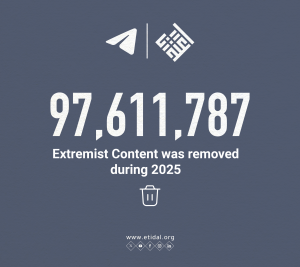Of the questions that come naturally across the mind of the observer of the religious interaction phenomenon, when following up with interactions on social media platforms and inside the ideological factories of extremist organizations, where they renew their arsenal of concepts according to their narrow organizational interests, using all available religious texts to what suits their goals. In addition to the use of political events, which they consider a valuable raw tool for creating a diversionary discourse, that will always cause confusion for poorly cultured minds against its malicious tricks. This prompts us to directly ask the following question: What makes a cleric, who under official institutions employ certain religious texts, represents a good role in reinforcing stability in their country. Whereas their counterpart employ the same religious texts as means to spread disturbance, incitement of violence and destruction of homelands? Is there a hidden chemistry that allows us to understand this odd approach of the same religious culture that plays this role and goes against it, where sometimes it is the protection of what is sacred to humans, while some make it a gateway to violate these sanctities represented in lives and assets, without feeling any remorse by the perpetrator’s moral conscience, which seems completely idle, behind deep ideological beliefs.
The reason for this, in our opinion, is due to the fatal confusion between two matters, in terms of the subject matter, and in terms of the logic of both of them. We mean here the religious authority in its symbolic dimension on one hand, and the policy of the state in managing religious affairs in the legal dimension on the other hand. Despite the similarity of the two meanings, the checking of the definition will make us understand the vast difference between the two phrases:
1- Religious authority refers to the size of the symbolic value of certain signs for the souls and beliefs of its believers, especially the issue of salvation associated with heaven and hell, which creates an impact on the followers of a particular religion. Thus, it appears authoritative and powerful, resembling to an extent a real authority in the areas associated with it. Perhaps this is what makes a place of worship for all religions a place where we show our veneration and respect for common religious signs, whose origin is drawn far from daily reality, for its primary mission is to protect the higher ideals that transcend the law of time and place. Each religion is initially a factor of liberation of the human spirit from the pressures of materialistic needs, and a guide towards spiritual needs that go beyond the narrow horizon of the present, in order to relate to a distant cosmic future that represents the human purpose of existing.
Therefore, this authority takes a symbolic form that is reflected on everyone who is related to the religious signs. Thus, the respect to clerics we usually see is not based on the fear of their authority, but is rather linked to the followers’ belief of the importance of knowledge they obtain in relation to the fate of their souls. This is what makes it a purely symbolic authority that influences the believers without being obliged to adopt a system of concrete punishments, for the domination of the religious authority over the bodies will not be useful if souls lose their voluntary deep-rooted faith, which is really the basis of all affiliations to religions.
2- On the other hand, a state’s policy management for religious affairs is part of managing its public affairs that are not formed solely of spiritual needs, but rather of people’s daily necessities of life. If the religious authority is far from reality and does not practically solve the daily issues of people, politics then, is the (art of the possible); that is the close attachment to daily life with all its complexity and simplicity regardless of the known ideals or values that can give answers on our existential questions, which does not directly benefit in healing humans from physical illnesses, or in protecting them from dangers of their reality that is not necessarily the subject of the voice of virtue. As long as the world is what it is, not what it should be, then the state, in this view, is not a world of clerics, but a world of citizens whose convictions, orientations and capacities of submission to religious and ethical restraints differ and vary.
Precisely in this sense, the policy of managing religious affairs is that of a politician’s in the first place through his/her rightful authority in using deterrent and supportive instruments for the religious aspects related directly to people’s lives, and in accordance to a scale of priorities demonstrated through an overlap of interests and demands of different nature; as a politician is not concerned with the submissiveness and ends of worshipers’ souls, but rather, his interest is focused on maintaining the welfare of mosques in light of public policies that include economy, security, health and other aspects. Therefore, the logic of politics differs radically from that of the religious authority, for what is based on the spiritually voluntary submissiveness that is based on the believing of religious aspects is linked in politics with a compulsory submissiveness to a state’s law that safeguards the interests of citizens and maintain the security of the state.
We believe that what drives some clerics to extremism resides in the mixing between the two levels, in addition to the pursuit of investing the symbolic religious authority in politics, which is essentially linked with the official and political institutions of each country. Thus, they mix between international systems, charters and the concept of relations that exceeds the geographical limits of their country; believing that the religious authority is a primary reference that is above all else. This is what makes a moderate cleric, one who knows his limits, appreciated and respected.
The immunity that respected clerics carry against extremism, which was the cause of bloodsheds of the innocents and the destruction of what the old generation have established many years ago, is due to their ability to see the fine line between what is sacred and what is mundane. They are fully aware that matters of faith are dependent on the adherents’ clinging to their own religious convictions, which cannot in any way become homogeneous among all people, all mighty Allah said in the Quran: “And if your Lord had willed, He could have made mankind one community” (Hud, 118). This is what makes them realize that matters of faith in terms of the spiritual experience or the cultural specificity remain a subject of an ongoing controversy, whether within the same religion, due to different jurisprudential and ideological doctrines of thought, or between religions in general due to different convictions of faith. For this reason, a righteous and moderate society knows that its venerable religious authority does not exceed its limits and remain within a specific religious group, and is always a subject to legal accountability. This prevents it from turning into a totalitarian authority, which will necessarily – if left unopposed – be forced to resort to the force of arms in order to impose fear for the faith, rather than being based on the belief.
Controversially, a cleric could resemble a factor of a double danger through his ability of deception at the religious and political levels among his followers, a cleric creates self-centered groups that do not have the civil competence to accept anything but their own group. That is why they are in constant anxiety and aggression from and towards everyone, whether towards moderate clerics who do not employ religion to satisfy their narrow interests, or towards politicians who work to protect the state through policies to achieve stability. Hence, their double threat to religion and politics appears. Their violence could affect minds, souls, and bodies altogether by confusing the religious and political legitimacy, in addition to humanitarian values. To deter this, a general tripartite strategy is presented, with hopes to get into further details later on:
– The protection of the religious legitimacy by shedding light on religious institutions of ancient historical depth, which always showed that tension over the different sects does not necessarily justify bloodshed, yet the same religious establishment has often nurtured sectarian difference, and therefore the emphasis on the multilateral nature of the doctrinal and ideological heritage can disrupt the narrow reductionist propaganda of extremists in complete ignorance of the richness of the religious culture and its great acceptability of difference and diversity.
However, it would be much important to provide a greater opportunity for cooperation and coordination between major religious institutions, by enabling them to have an inclusive framework that allows them to negotiate through their official and unofficial representatives, the major critical questions that concern crucial Islamic issues, and to fill the void in addition to directing efforts that moderate mujtahids suffer from in Islamic countries.
– The protection of the politics legitimacy by controlling the limits of the validity of religious authority, which its sanctity, as we have seen previously, rests in its symbolic and faithful character. Therefore, it is a power that does not use the means of coercion, simply because there is no compulsion of souls, in contrast, the political power is not linked in its essence to what is voluntary and optional, but with what is under the law. Hence lies the necessity to distinguish between the religious fatwa in crucial matters and the law in its political form. If the first was a differentiable ijtihad in issues that concern direct lives of people, then the law is the decision of an institutional authority that the judicature is responsible for its arbitration and governments in its implementation. Therefore, it is indisputable and with no exceptions.
– The protection of value-based credibility of humanity through institutions whose mission is to confront the culture of deception that seeks to perpetuate conflicts and to develop hostility between beliefs, by refuting hostile ambiguities that seek to unlawful and inappropriate use of religious texts.
In conclusion, we would like to emphasize that the wisdom and prudence of the venerable scholars of Islam have absorbed since the old times the crucial importance of controlling the distance between the requirements of ijtihad, the necessities of interests, and the necessity for improvement, which indicates that their attention to the precepts of religious sayings has never made them overlook its impact on people’s lives, and what difficulties and disruption of their interests may result from it; hence their extreme discipline of the authority of the rulers, unlike some frightening cases in which their positions often led to crises that resulted into corruption that dragged their country into chaos.
Published Sunday September 6th 2020 in Asharq Al-Awsat Newspaper.





